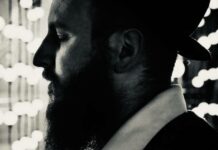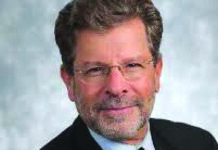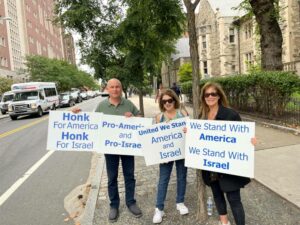
Your head was probably spinning if you attempted to keep up with all the updates relating to the Palestine Writes Festival.
The Zionist Organization of America called for the University of Pennsylvania to ban the event from its campus. Other Jewish groups and individuals, from Penn Hillel to American Jewish Committee CEO Ted Deutch, asked the university to condemn speakers who had made anti-Israel comments in the past.
Penn’s administration, led by President M. Elizabeth Magill, obliged but allowed the Sept. 22-24 festival to go on. The executive director of Palestine Writes, novelist Susan Abulhawa, said the event celebrated Palestinian culture but did not deny that it would stand against Israel’s very existence. She also said that Penn students who felt unsafe due to the gathering were making baseless claims.
All of this got heaps of local and national news coverage. So, what would happen when the festival finally began?
2 p.m.
As you walked up Spruce Street toward Irvine Auditorium on Penn’s campus, you saw a line of people waiting to get in the door. But before you got to the crowd, you ran into three people holding white signs with blue text.
“Pro America and Pro Israel,” read one. “United We Stand,” said another.
The folks holding up the signs are Gerri Richmond, Sheila Berman and Don Sable, all Jews from Elkins Park (though Berman lives in Florida now). They came because they viewed the event as hostile to Israel and Jews.
But the suburbanites were the only Jewish protesters outside the auditorium. Instead of picketing the event, Penn Hillel hosted a Shabbat dinner with students and other members of the Jewish community. Deutch, representing the AJC, attended, too.
“I sent emails to ADL (Anti-Defamation League). We spoke at our synagogues,” Richmond said. “The response was that Hillel will have a Shabbat dinner.”
Berman explained that speakers at the festival, such as former Pink Floyd frontman Roger Waters, had histories of denigrating the Jewish state. They had gone beyond celebrating Palestinian culture.
“We’re not just talking about people who might write something pro-Palestinian. They have that right, and they have that right to meet and talk,” Berman said.
3:30 p.m.
Festival attendees made their way in, noshing on free food in an adjoining room and finding seats. They came from all over the country and even the world. Many did not wish to speak to the media.
A woman who did not want to be quoted still said, “There aren’t two sides to injustice.”
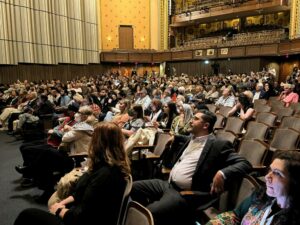
But a couple of people were willing to talk. Hanna Salmon traveled from Texas. She comes from “a Scottish background,” she said. But she’s here because she’s “interested in the Palestinian cause.”
“What’s happening in Palestine is unjust,” Salmon explained. “Storytelling is a big part of how to fight that injustice.”
Rami Kanso came from Jordan. His wife, Dana Dajani, was about to perform spoken word poetry in a little over an hour. Kanso said it was nice to “gather for Palestine” in a positive way.
“When we gather for Palestine, it’s always for protest or there’s war happening, Gaza being bombed, children being killed,” he said. “This is more celebrating the culture.”
4:30 p.m.
For the event’s opening act, music played overhead and dancers kicked and swayed in unison. The packed crowd in the bottom level of Irvine Auditorium clapped, cheered and stood.
Minutes later, Philadelphia-based comedian Amer Zahr took to the stage.
“They’ve been trying to get rid of us,” Zahr said. “There’s only one reason you try to silence the other side: Because you are lying.”
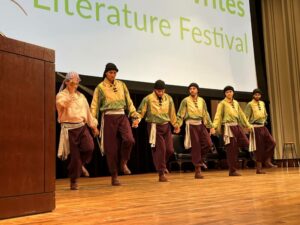
The crowd cheered.
Then, it’s Huda J. Fakhreddine’s turn. The Penn professor of Arabic literature and event organizer also referenced the controversy surrounding the festival. But the festival was still happening, she said.
“This battle for voice, agency, literature and the arts has been won,” she continued.
The people cheered again.
To close the opening act, Abulhawa walked forward from the back of the stage and gave a 20-minute speech.
“It’s about the fact that we remain proud, unbroken, defiant,” she said of the event. “Even though we are battered, colonized, exiled, robbed, terrorized and demeaned.”
6 p.m.
It’s the event of the night: A panel discussion on “The Cost of Friendship” with Palestinians featuring Waters, left-wing journalist Gary Younge and novelist Viet Thanh Nguyen. Waters video chatted in.
He revealed that he was in Philadelphia. He was just told not to come to campus by Penn’s Division of Public Safety. Waters was originally going to participate remotely. But he decided to show up after reading articles in Jewish newspapers about the controversy surrounding the event.
Waters attempted to explain how he came to support a cultural boycott of Israel. Fans emailed him asking him to cancel a 2005 show in Tel Aviv. He obliged.
“This has nothing to do with antisemitism,” he said. “There is not a single modicum of antisemitism in my heart.”




